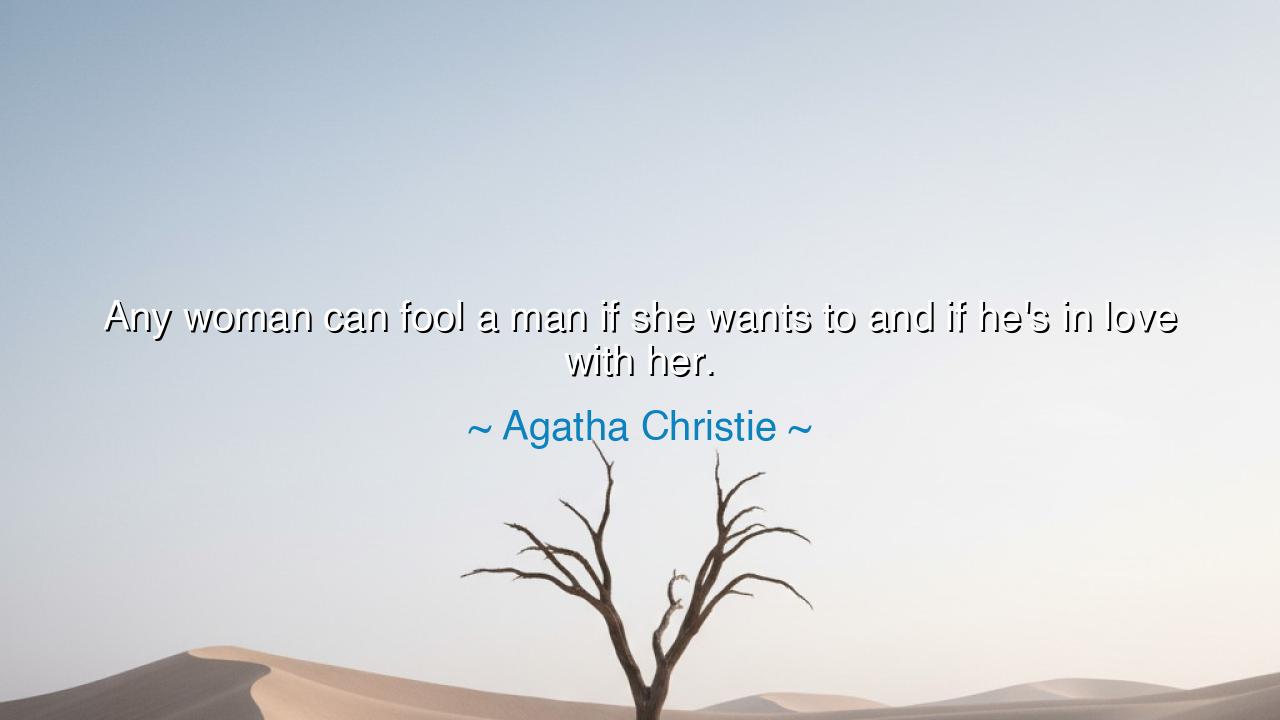
Any woman can fool a man if she wants to and if he's in love with






"Any woman can fool a man if she wants to and if he's in love with her." — thus spoke Agatha Christie, the great mistress of mystery and human insight, whose pen unmasked the hidden motives of the heart as skillfully as it solved crimes. Beneath the wit of her words lies a truth both sharp and timeless — a truth about love, perception, and illusion. For love, that wondrous fire which lifts the human soul, also blinds it. And in that blindness lies both its beauty and its danger. Christie, ever the keen observer of human nature, did not speak these words as cynicism, but as wisdom born of understanding — that emotion clouds judgment, and that love, in all its tenderness, can make even the most discerning mind see what it wishes to see.
In this saying, Christie unveils the ancient tension between truth and desire. When a man is in love, his gaze is not that of a detective or philosopher — it is that of a dreamer. He does not see the woman as she is, but as he wishes her to be. The beloved becomes a mirror for his longing, and in that mirror, he loses clarity. A woman, in turn, aware of this sacred blindness, wields a quiet power. It is not deceit in the cruel sense, but the recognition that love, when deep, makes the heart vulnerable. To fool such a heart is easy, not because women are inherently deceitful, but because love itself is a spell, one that bends reality to affection. Christie’s words, therefore, are not condemnation, but revelation — an acknowledgment of love’s dual nature, capable of tenderness and trickery alike.
The origin of this truth flows from both the world of literature and Christie’s own life. As the author of The Murder of Roger Ackroyd and And Then There Were None, she understood how deeply hidden motives drive human actions. Her characters deceived and were deceived, not only in murder, but in love. And Christie herself once vanished for eleven days in a mystery that remains unsolved — a disappearance many believe was bound to heartbreak and betrayal. She knew, as few do, how easily the heart can weave illusion when wounded or adored. Through her words, she gave voice to a wisdom as old as Helen of Troy, whose beauty stirred empires and drove men to madness. For when passion rules, reason bows, and even kings are undone.
History, too, bears witness to the power of this truth. Consider Mark Antony, the Roman general, mighty in battle but defenseless before the charms of Cleopatra. He was a warrior of iron will, yet before her, he became a lover — pliant, blind, and devoted. The world called her enchantress, but her true weapon was not sorcery; it was understanding. She knew the weakness hidden within strength, the blindness hidden within love. And so Antony, who could not be defeated by legions, was undone by affection. Love, when unguarded, made him see not the woman before him, but the goddess he wished her to be. This is what Christie understood: that in the presence of adoration, truth becomes soft clay, shaped by longing.
Yet there is no cruelty in this, if we see rightly. For the ability to fool is but one side of the power to charm — and charm, in its purest form, is born of the same mystery that makes love divine. When the heart is open, it does not analyze; it surrenders. The danger lies not in love itself, but in forgetting that it is both a gift and a test. To love wisely is to see the other as both human and sacred, neither idol nor illusion. To love blindly is to give away one’s discernment, to mistake desire for truth. Thus, Christie’s warning is not against women, nor against love, but against naïveté — the kind that turns passion into peril.
There is also in her words an unspoken reverence for the intuitive power of women — that ancient, often misunderstood wisdom that sees beyond appearances. Women, Christie implies, have long lived in a world where subtlety is survival. Their strength often lies not in physical might, but in perception — in understanding hearts even when those hearts misunderstand them. To "fool" a man in love is, at times, not deceit, but the art of survival, the delicate play between vulnerability and control. Yet with such power comes responsibility: for manipulation born of fear or vanity leads to ruin, while understanding born of love leads to harmony.
So let this be the teaching: Love is both light and shadow. It can reveal truth or conceal it, depending on the heart that wields it. To those who love, remember — affection must not blind you to reality. See clearly, even when your heart is aflame. And to those who are loved, remember — never use that power to deceive, for every illusion built in love will one day demand a reckoning. True love thrives not in blindness, but in honesty — when both hearts dare to see, and still choose to stay.
And remember, O seekers of wisdom, the deeper lesson beneath Christie’s keen observation: that love is not a riddle to be solved, but a mirror to be understood. It reveals our longing, our fears, our need to believe. The wise lover, therefore, learns to balance faith with sight, tenderness with truth. For when love sees clearly and still believes, when it knows the flaws yet holds the heart — then, and only then, is it no longer a spell, but a covenant. And that, perhaps, is the mystery that even Agatha Christie could not outwit.






AAdministratorAdministrator
Welcome, honored guests. Please leave a comment, we will respond soon